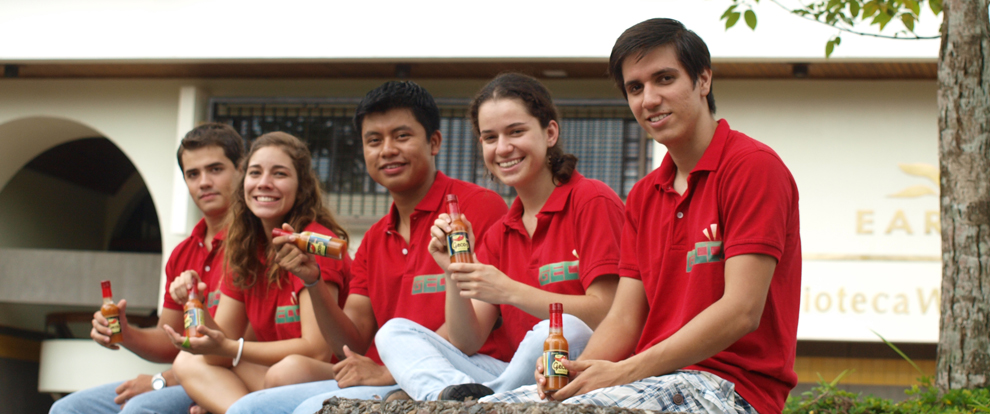Entrepreneurial Dreams Foster at EARTH
One of the special elements EARTH University has focused on since its inception almost 22 years ago has been the nurturing of the entrepreneurial spirit among its students starting out their first year of school.
Developing a business mindset while putting those skills in practice is something that attracted second year student Jorge Ferraté to EARTH a couple of years ago.
“I had heard that the University focused a great deal on entrepreneurship and that was something that got my attention since I have always wanted to pursue a career in business.”
Ferraté, along with five other second-year students: Eddie Ochoa, Tatiana Salas, Miguel Ruiz, Juan Luis Yaque, and Ligia Araya created an entrepreneurial project making a hot sauce cleverly named Gecos, which initials represent the team members’ countries of origin: Guatemala, Ecuador and Costa Rica. This three-year project is a requirement for all students at EARTH.
In selecting their projects, students often look at what businesses have traditionally succeeded in the humid tropics and at EARTH. Some projects have also received in the past financial incentives for innovation. Gecos hot sauce is the first hot sauce in the history of the Jorge Manuel Dengo O. Entrepreneurial Projects Program at EARTH University.
“One day, I was sitting in the cafeteria by myself. I looked over and saw empty bottles of hot sauce on each of the tables and that’s when I had the idea to start this business,” Ferrate explained with a smile in his face.
During their first year, EARTH students must complete a feasibility study and business plan before they start their business venture. They have to defend the plan before a committee of faculty and internal and external experts before EARTH grants the loan for the project’s implementation.
“All of the professors support us when it comes to our entrepreneurial projects,” said second year student Eddie Ochoa. “The idea of the University, more than anything, is that we gain the experience of running a business, which is then reinforced by the theory (learned in the classroom.”
The Gecos innovative marketing techniques have helped business and they surpassed their earnings expectations for the year in just the first six months of operation. One of their tactics included creating a video for a contest on Facebook. The group topped their competition by obtaining close to 400 comments and “likes” in a week’s time.
While 80 percent of all the student projects close their businesses with a profit, some run into unexpected problems and are not successful. Even in these cases, however, the learning experience stays with the students.
One such example is Tropi One S.A. Their entrepreneurial project, consisting of a sports drink, began when the world financial crisis was at its peak.
“After doing the feasibility study, we thought that the business was going to work out,” said Jose Manuel Garcia, now a fourth-year EARTH student from Costa Rica. “However, from one day to another, the prices for our materials went up significantly. It got to a point where we were losing 20 Colons per bottle that we sold.”
“Logically,” Jose Manuel explained, “the profits did not match our expectations due to circumstances beyond our control, such as the (financial) crisis.”
“(Being profitable) was not as important to me as the fact that we learned what factors to focus on next time we start a new business venture outside the University,” said Jose Manuel, whose student-run company consisted of EARTH student members from Nicaragua, Colombia, Mexico and Costa Rica.
Jose Manuel credits the professors on campus for the gift of that knowledge, which come December, he will be taking with him on his new life as an EARTH graduate who hopes to start a business of his own in the near future.
“The University gives us a lot of room to grow in the entrepreneurial sense,” Jose Manuel added. “Our professors are always there to assist us with any doubts that we may have regarding a project or a subject matter.”




